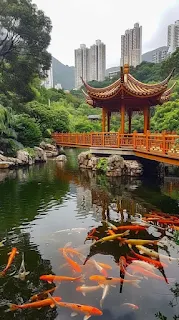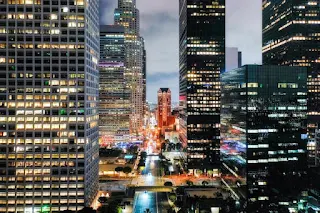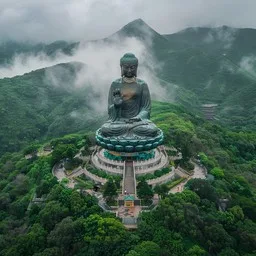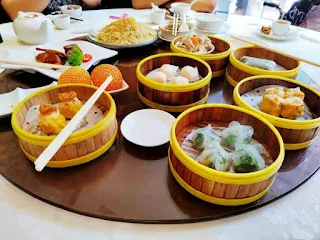Hong Kong: A City of Contrasts
Hong Kong: A City of Contrasts
Here we are in Hong Kong, ready to discover. Though I've been to Guangzhou many times, the city of art, cuisine, and shopping that I love extensively, I haven't been to Hong Kong yet. But that doesn't matter. Let's travel from your seat with me now, relaxed and ready:
 |
Serene Koi Pond |
Introduction
1- Historical Background of Hong Kong.
2- Economic Powerhouse.
3- Cultural Melting Pot.
4- Language and Education.
5- Festivals and Traditions.
7- Social and Political Landscape.
8- Political System.
10- Challenges and Future Prospects.
11- Integration with Mainland China.
12- The Future of Hong Kong.
Conclusion
Introduction
Hong Kong, a Special Administrative Region (SAR) of China, is a vibrant, bustling metropolis known for its towering skyscrapers, deep natural harbor, and dynamic culture. With a population of over 7 million people crammed into just over 1,100 square kilometers, Hong Kong is one of the most densely populated places in the world. This city is a unique blend of Eastern and Western influences, reflecting its history as a former British colony and its current status as a part of China under the "one country, two systems" principle. This essay explores the history, economy, culture, and future prospects of Hong Kong.
1- Historical Background of Hong:
Hong Kong's history is a tapestry woven with colonial influence, Chinese heritage, and global interactions. The territory was ceded to the British in 1842 after the First Opium War under the Treaty of Nanking. Over the next century, Hong Kong grew from a small fishing village into a bustling port and trade center. The British colonial period left an indelible mark on the city's legal, educational, and administrative systems.
 |
| City street |
In 1997, Hong Kong was handed back to China under the principle of "one country, two systems," which promised to maintain its capitalist system and way of life for 50 years. This arrangement allowed Hong Kong to retain its own legal system, borders, and rights, including freedom of speech and assembly, which are not available in mainland China.
2- Economic Powerhouse:
Hong Kong is one of the world's leading financial centers, rivaling New York and London. Its economy is characterized by low taxation, free trade, and minimal government intervention. The city serves as a global hub for banking, finance, and trade. The Hong Kong Stock Exchange is one of the largest in the world, and the city hosts numerous multinational corporations.
Hong Kong's economy is highly dependent on international trade and finance. The port of Hong Kong is one of the busiest in the world, serving as a gateway between East and West. The city has also become a significant center for business services, such as legal and accounting services, due to its robust legal framework and the presence of numerous international law firms.
3- Cultural Melting Pot:
 |
| Sunset City skyline |
Hong Kong is a cultural melting pot where East meets West. This blend is evident in its architecture, cuisine, festivals, and daily life. Traditional Chinese customs coexist with British colonial influences, creating a unique cultural landscape.
Cultural Heritage:
- Temples: Hong Kong has numerous temples, such as Wong Tai Sin Temple and Man Mo Temple, reflecting the religious and cultural heritage.
 |
| Majestic Buddha Statue |
 |
| Sunset |
- Traditional Markets: Markets like Temple Street Night Market and Ladies' Market offer a glimpse into traditional commerce, with stalls selling everything from clothes to street food.
 |
| Street market |
 |
| Street market |
4- Language and Education:
Cantonese is the dominant language, but English is also widely spoken, particularly in business and government. This bilingualism is a remnant of British rule and contributes to Hong Kong's global connectivity. The education system in Hong Kong is highly regarded, with a strong emphasis on mathematics and science. Many students attend international schools, preparing them for higher education abroad.
5- Festivals and Traditions:
Hong Kong celebrates a variety of festivals, reflecting its diverse heritage. Chinese New Year is the most significant, marked by lion dances, fireworks, and family gatherings. Other traditional festivals include the Mid-Autumn Festival and Dragon Boat Festival. Additionally, the city observes Western holidays such as Christmas and Easter, showcasing its multicultural identity.
6- The Cuisine:
 |
| Dim Sum feast |
 |
| Honeycomb Waffle Cookie |
Hong Kong is renowned for its culinary scene, which offers a wide range of cuisines from around the world. Traditional Cantonese dishes, such as dim sum, roasted goose, and seafood, are local favorites. The city's food culture is vibrant and diverse, with everything from street food stalls to Michelin-starred restaurants.
 |
| Traditional Cantonese dish |
7- Social and Political Landscape
The social and political landscape of Hong Kong is complex and has been a subject of intense global scrutiny, particularly in recent years.
8- Political System:
Hong Kong operates under a "one country, two systems" framework, which grants it a high degree of autonomy. It has its own legal and political systems, separate from mainland China. The Chief Executive is the head of the government, elected by a committee, while the Legislative Council (LegCo) is the law-making body. However, the process for selecting the Chief Executive and the members of LegCo has been a contentious issue, with calls for greater democracy and universal suffrage.
9- Social Movements:
In recent years, Hong Kong has witnessed significant social and political unrest. The 2014 Umbrella Movement saw pro-democracy activists occupying central areas of the city for weeks, demanding electoral reforms. More recently, in 2019, large-scale protests erupted against a proposed extradition bill that would have allowed suspects to be sent to mainland China for trial. The protests evolved into a broader pro-democracy movement, calling for greater autonomy and opposing Beijing's increasing influence.
 |
| Umbrella Movement |
In response to the protests, Beijing imposed a national security law in 2020, which has been criticized for undermining Hong Kong's autonomy and freedoms. The law targets acts of secession, subversion, terrorism, and collusion with foreign forces. Its implementation has led to the arrest of numerous activists and politicians, raising concerns about the future of civil liberties in Hong Kong.
10- Challenges and Future Prospects:
Hong Kong faces several challenges that could shape its future.
1. Economic Challenges:
 |
| Hongdone |
While Hong Kong remains a financial powerhouse, its economy faces challenges. The city has one of the highest income inequalities in the world, with a significant portion of the population living in poverty. The high cost of living, particularly housing, is a major issue. Many residents live in cramped, subdivided flats, often referred to as "coffin homes." The government has introduced measures to increase housing supply, but the problem persists.
The economic slowdown in China, trade tensions between China and the United States, and the impact of the COVID-19 pandemic have also affected Hong Kong's economy. The city's reliance on tourism and retail sectors, which have been hard-hit by the pandemic, underscores the need for economic diversification.
2. Political and Social Challenges:
The imposition of the national security law has raised concerns about the erosion of Hong Kong's autonomy and freedoms. The law has led to a crackdown on dissent, with activists and politicians arrested or fleeing the city. Media freedom has also been impacted, with the closure of prominent pro-democracy newspaper Apple Daily.
These developments have sparked fears of a brain drain, with many residents considering emigration. Countries such as the United Kingdom, Canada, and Australia have offered pathways to residency for Hongkongers, potentially leading to an exodus of talent.
11- Integration with Mainland China
 |
| Chi Lin Temple in Nan Lian Garden |
Hong Kong's integration with mainland China is another key issue. The city is part of the Greater Bay Area initiative, which aims to create a megacity region including Hong Kong, Macau, and nine cities in Guangdong province. This initiative seeks to enhance economic cooperation and development, but it also raises concerns about the preservation of Hong Kong's unique identity and autonomy.
12- The Future of Hong Kong:
Despite the challenges, Hong Kong's future remains a subject of both concern and hope.
1. Maintaining a Global Role:
Hong Kong's strategic location, robust legal framework, and business-friendly environment will continue to attract international businesses and investors. The city's ability to maintain its role as a global financial center will depend on its political stability and the preservation of its unique legal and economic systems.
2. Technological Innovation:
Hong Kong has the potential to become a leader in technological innovation. The government has been investing in the development of the innovation and technology sector, aiming to transform the city into a smart economy. Initiatives such as the Hong Kong Science Park and Cyberport are designed to support startups and foster innovation.
3. Cultural Resilience:
Hong Kong's cultural resilience is another factor that will shape its future. The city's unique blend of Eastern and Western cultures, its vibrant arts scene, and its culinary diversity are strengths that will continue to attract visitors and residents alike. Efforts to preserve and promote its cultural heritage will be crucial in maintaining its distinct identity.
 |
| Statue in Grand City building |
4. Youth and Activism:
The youth of Hong Kong have been at the forefront of social and political movements, demonstrating a strong commitment to their city's future. Their activism and engagement are likely to continue, shaping the city's social and political landscape. The challenge will be to channel this energy into constructive dialogue and solutions for the city's challenges.
In conclusion, Hong Kong is a city of contrasts and complexities, where East meets West, tradition meets modernity, and autonomy meets integration. Its history as a British colony and its current status as a part of China create a unique dynamic that shapes its identity and future. While the city faces significant challenges, including economic inequality, political unrest, and the erosion of freedoms, its resilience, strategic location, and global connectivity offer hope for a prosperous future.
The ability of Hong Kong to navigate these challenges will determine its place in the world. Whether it remains a vibrant, autonomous hub of international finance and culture, or becomes more closely integrated with mainland China, will depend on the actions of its government, its people, and the broader geopolitical context. Whatever the future holds, Hong Kong's spirit of resilience and innovation will undoubtedly play a crucial role in shaping its destiny.
Hope You Enjoyed your Trip



Comments
Post a Comment